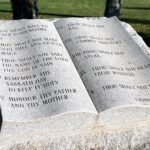Paul Law and Grace
We live in an era of theological confusion. Many good friends of mine tell me I do not have to keep the “law”, usually because they are unhappy or confused as to why one would keep the Sabbath on the seventh day. I might ask if it is okay to kill or to commit adultery and they always answer no. Steal? Lie? Covet? The answer is always “no”. Must I put God first in my life? Answer is always yes. Should I worship idols or use God’s name in vain? Answer is always “no.” Should I keep the 7th day as the Sabbath? Answer is “no” or “why would you want to be like the Jews?” I guess my friends are 9/10ths Jewish and don’t realize it as they are keeping 9 out of the 10 commandments. It is like only having 90% of your DNA, it just doesn’t work right.
Without law there is anarchy. Without love there is death. “Love without law doesn’t work, neither does law without love.” (John Klassek). Are Christians to keep the law of God once converted and imbued with the Holy Spirit? Or are Christians allowed to decide their own laws and their own way of life? Some say the law of God is done away and a Christian is saved by grace…no matter what the Christian does. This concept is referred to as “cheap grace.” How should a Christian live their life? Did God give a code of ethics for Christians to follow?
In this discussion we will look at God and His law in the past, present and future which will help us understand what the Christian is to do. We will see we are SAVED by His grace and we keep His moral code called the Ten Commandments in obedience to Him.
The following is an important baseline understanding about the “law of God”.
Deut. 10:1-5 Moses tells us, “At that time the Lord said to me,’ Hew for yourself two tablets of stone like the first, and come up to Me on the mountain and make yourself an ark of wood. 2 And I will write on the tablets the words that were on the first tablets, which you broke; and you shall put them in the ark.’ 3 So I made an ark of acacia wood, hewed two tablets of stone like the first, and went up the mountain, having the two tablets in my hand. 4 And He wrote on the tablets according to the first writing, the Ten Commandments, which the Lord had spoken to you in the mountain from the midst of the fire in the day of the assembly; and the Lord gave them to me. 5 Then I turned and came down from the mountain and put the tablets in the ark which I had made; and there they are, just as the Lord commanded me.” (Also see Ex. 25:16).
God distinctly had Moses put the Ten Commandments inside of the Ark of the Covenant. What about the rest of the Mosaic laws?
Deut. 31:24-26 “So it was, when Moses had completed writing the words of this law in a book, when they were finished, 25 that Moses commanded the Levites, who bore the ark of the covenant of the Lord, saying: 26 “Take this Book of the Law, and put it beside the ark of the covenant of the Lord your God, that it may be there as a witness against you;” The rest of the civil and religious laws were distinct from the Ten Commandments and were put NEXT to the Ark.
We begin in the end (The future). “And the dragon was enraged with the woman, and he went to make war with the rest of her offspring, who keep the commandments of God and have the testimony of Jesus Christ.’ (Rev. 12:17 NKJV emphasis mine. All verses are NKJV unless otherwise noted). “Here is the patience of the saints; here are those who keep the commandments of God and the faith of Jesus.” (Rev. 14:12).” Blessed are those who do His commandments, that they may have the right to the tree of life, and may enter through the gates into the city. But outside are dogs and sorcerers and sexually immoral and murderers and idolaters, and whoever loves and practices a lie.” (Rev. 22:14-15). In the future, God blesses those who kept His commandments. The ten commandments which were put inside the Ark of the Covenant (Literally the Ten Words) cannot be done away with since God is using them to judge the faithful of the future.
The ten commandments were BEFORE Moses and Sinai. God was going to bless the descendants of Abraham “because Abraham obeyed My voice and kept My charge, My commandments, My statutes, and My laws.” (Gen. 26:5). The Ten Commandments are the only law God spoke with His own voice. All the rest of the “laws” (613 in total) were written in a book and placed beside the Ark of the Covenant (Deut. 31:26). The ten commandments are distinct in the eyes of God. The ten commandments were written in stone and stored in the Ark of the covenant (Deut. 10:1-5). They were distinct and separate from the other 613 written laws of the Torah.
Section one: The moral law of God (Ten Commandments) was before Moses as we read in Gen. 26:5. God does not change His morals, He cannot sin (I John 3:9), He remains the same yesterday, today and tomorrow (Heb. 13:8). The law of God does not change.
How did Moses view the law of God? Favorably. Moses knew the law (The ten commandments) were the covenant of God with Israel (Ex. 34:27-28).
How did David view the law of God? Favorably. “Blessed is the man who walks not in the counsel of the ungodly, nor stands in the path of sinners, nor sits in the seat of the scornful; But his delight is in the law of the LORD, And in His law, he meditates day and night.” (Psalms 1:1-2). “The law of the LORD is perfect…, The commandment of the LORD is pure…” (Psalms 19:7-9). “Blessed are the undefiled in the way, who walk in the law of the LORD! Blessed are those who keep His testimonies, who seek Him with the whole heart.” (Psalms 119:1-2). In Psalms chapter 119, David praises God’s Holy ten commandments 38 times.
How did Jesus view the law of God? Favorably. In Matthew 5:17-19 we read that Jesus did not “come to destroy the Law or the prophets. I did not come to destroy but to fulfill. For assuredly, I say to you, till heaven and earth pass away, one jot or one tittle will by no means pass from the law till all is fulfilled.” Jesus is the only human who ever successfully lived an entire life and did not sin. When the rich young ruler asked Jesus what he must do to have eternal life (be saved from permanent death) Jesus summarized the commandments. (Matt. 19:16-22). On His last night of life Jesus said, “If you love me, keep My commandments.” (John 14:15).
How did James, the brother of Jesus view the law of God? Favorably. “For whoever shall keep the whole law, and yet stumble in one point, he is guilty of all…” (James 2:10-12). “Do not speak evil of one another, brethren. He who speaks evil of a brother and judges his brother, speaks evil of the law and judges the law. But if you judge the law, you are not a doer of the law but a judge. There is one Lawgiver, who is able to save and to destroy. Who are you to judge another? James 4:11-12). “Therefore, to him who knows to do good and does not do it, to him it is sin.” (James 4:17).
How did John view the law? Favorably. “Now by this we know that we know Him, if we keep His commandments. He who says, “I know Him,” and does not keep His commandments, is a liar, and the truth is not in him.” (I John 2:3-4). “Whoever commits sin also commits lawlessness, and sin is lawlessness. (I John 3:4). “Whosoever committeth sin trangresseth also the law: for sin is the transgression of the law.” (I John 3:4 KJV). “And whatever we ask we receive from Him, because we keep His commandments and do those things that are pleasing in His sight.” (I John 3:22). “By this we know that we love the children of God, when we love God and keep His commandments. For this is the love of God, that we keep His commandments. And His commandments are not burdensome.” (I John 5:2-3). To love God, we must keep His commandments. “Love without law doesn’t work, neither does law without love.” (John Klassek). The apostle John wrote these in the 90’s A.D.
Section two: How did Paul view the law? Interesting question. “…as our beloved brother Paul, according to the wisdom given to him, has written to you, as also in all his epistles, speaking in them of these things, in which are some things hard to understand, which untaught and unstable people twist to their own destruction, as they do also the rest of the Scriptures. “(II Pet. 3:15-16). Through Paul we learn the law cannot justify or save us. (Rom. 3:20). There is a better righteousness than law keeping and we survive permanent death only by the grace of God. Peter admits people twist what Paul has to say and Paul writes of the things “hard to be understood”.
Paul part I: We cannot be saved by the keeping of the law. Paul, having been a pharisee who kept the law was very clear on this point: keeping the ten commandments does NOT save us. Paul said, “…have no confidence in the flesh, though I also might have confidence in the flesh. If anyone else thinks he may have confidence in the flesh, I more so: circumcised the eighth day, of the stock of Israel, of the tribe of Benjamin, a Hebrew of the Hebrews; concerning the law, a Pharisee; concerning zeal, persecuting the church; concerning the righteousness which is in the law, blameless.” (Phil. 3:3b-6). Paul realized no amount of law keeping could save anyone. Isaiah the major prophet tells us, “…And all our righteousness are like filthy rags;” (Isa. 64:64a). Nothing we can do will save us. Only Jesus Christ and Him crucified will save us from death. (Acts 4:12; Gal. 2:20-21). Whether we are gentile or Jew, keeping the law does not save us. (Rom.9:3-32). Through Jesus, God revealed a righteousness “apart from the Law.” For all have sinned and fall short of the glory of God, being justified freely by His grace…” (Rom. 3:20-26.). Only the sacrifice and life of Jesus as our redemptive offering for sin saves us. The law cannot save us as we are all failures at keeping the law and guilty of death. (Rom. 6:23a). Our own righteousness will not and cannot save us. “…not having my own righteousness, which is from the law, but that which is through faith in Christ, the righteousness which is from God by faith;…” (Phil. 3:9b). Our righteous law keeping is simply not good enough for salvation through Jesus Christ. Faith is righteousness above the law. Paul delightfully explains how the law was meant to work for us, “Wherefore the law was our schoolmaster to bring us unto Christ, that we might be justified by faith. But after that faith is come, we are no longer under a schoolmaster.” (Gal. 3:24-25 KJV). The law led us to Jesus, it showed us the way to righteousness through Jesus. Now that we have Jesus to save us, we no longer need the schoolmaster because the law is now in our hearts. Jesus, the God of the Old Testament said, “For this is the covenant that I will make with the house of Israel after those days, says the LORD: I will put My laws in their mind and write them on their hearts;” (Heb. 8:10). We are only saved by grace with faith and we keep the law because He wrote it on our hearts.
Paul Part II: How did Paul view the law? Favorably. We have seen no one can earn their salvation by keeping of the law (Ten Commandments). Our law keeping does not impress God. Yet, Paul, a Pharisee converted to his apostleship in Jesus made the following favorable statements concerning the law. “Do we then make void the law through faith? Certainly not! On the contrary, we establish the law.” (Rom. 3:31). “Therefore, the law is holy, and the commandment holy and just and good.” (Rom. 7:12). Our children are told to “Honor your father and Mother,” which is the first commandments with promise.” (Eph. 6:1). Paul gave us a wonderful example of how “law keeping” brings blessings. “Blessed is the man to whom the LORD shall not impute sin.” (Rom. 4:8). We read “sin is the transgression of the law” (I John 3:4 KJV) and that we all sin and fall short of the glory of God. (Rom. 3:23). Only Jesus can take our sin away and impute no sin to us. This faith is the “righteousness above the law.” “What shall we say then? Shall we continue in sin that grace may abound? Certainly not! How shall we who died to sin live any longer in it? (Rom.6:1-2).
Paul Part III: Paul and the Bible teach us our salvation is from grace through faith. Grace to Faith which equals Belief. (Eph. 2:8-9). The entire world was to be destroyed by God for sin (law breaking) “But Noah found grace in the eyes of the LORD.” “Noah was a just man.” (Gen.6:8-9b). Noah obeyed God and had faith in God, thus he found “grace” in God. Grace and faith go together. Concerning Abraham, …”he believed in the LORD, and He accounted it to him for righteousness.” (Gen. 15:6). Abraham believed and this belief made him righteous. We find in Luke 18:9-14 the Pharisee prayed and justified himself. The tax collector was humble and he asked for mercy and was justified. The law keeping Pharisee was not justified but the tax collector was. Grace and faith with humility (Isa. 66:2). We can try all we want to keep all 613 laws of the Torah perfectly but we will fail and can only be saved by God’s magnificent grace.
Jesus is giving us unmerited pardon for our sins, this is grace. The law guides and directs (like a school master) us to walk uprightly before God. It is our basic ethical standard of behavior. But we are only saved by faith in Jesus through grace as we all have and will sin. (Rom. 3:23). God’s law is now written on our heart (rather than on two tablets of stone). (Heb. 8:10). Jesus was our sacrifice and His blood cleanses us. We are only sanctified through Him and His blood and his life. He writes His law on our heart so we may obey Him fully but we are only saved by His grace. (Heb. 10:1,9-10,16-18). The Ten Commandments teach us how to live a Godly life but only the grace of God saves us from death.
Before Paul was arrested in Jerusalem on false allegations, we see a remarkable exchange between Paul and James, the brother of Jesus. In this exchange we learn EXACTLY what the Jews were going to charge Paul with and what the church did to clear Paul of the false charges. We find this remarkable tale in Acts 21:17-25. James says to Paul, “but they have been informed about you that you teach all the Jews who are among the Gentiles to forsake Moses, saying that they ought not to circumcise their children nor to walk according to customs. What then? The assembly must certainly meet, for they will hear that you have come. Therefore, do what we tell you: We have four men who have taken a vow. Take them and be purified with them and pay their expenses so that they may shave their heads, and that all may know that those things of which they were informed concerning you are nothing, but that you yourself also walk orderly and keep the law.” (Acts 21:21-24). Paul kept the law, the same ten commandments which were in the Ark of the Covenant. Confirmed by James the apostle, the brother of Jesus.
When arrested in Jerusalem and then sent to Caesarea, Paul had a very unique defense against his Jewish accusers. It had now been about 20 years since he was called to Jesus on the road to Damascus. Much time had passed and he had preached the Apostles Doctrines (Acts 2:42) all across Greece and Asia. The Chief Priest (Ananias) and his men accused Paul of many things. Most notably they accused him of breaking Jewish law. The exact accusations are found in Acts 24:3-6 and foretold by James in Acts 21:17-25 and stated completely in Acts 21:27-28. Paul answered forthrightly in Acts 24:14 “But this I confess to you, that according to the Way which they call a sect, so I worship the God of my fathers, believing all things which are written in the Law and in the Prophets.” Paul had not profaned the law or they would have stoned him. Two years later, while still in jail in Caesarea, Paul once again had to defend himself from the Jews. “When he had come, the Jews who had come down from Jerusalem stood about and laid many serious complaints against Paul, which they could not prove, while he answered for himself, “Neither against the law of the Jews, nor against the temple, nor against Caesar have I offended in anything at all.” (Acts 25:7-8). After 20 years of apostleship, the Jews could not prove nor find any evidence he had broken the law. Paul had found a righteousness above the law in grace through faith and he had kept the law on his heart as prophesied by Jeremiah (31:31-33) and fulfilled in Heb. 8:10.
Finally, facing the end of his life at the hand of Caesar, Paul stated, “Men and brethren, though I have done nothing against our people or the customs of our fathers…,” Acts 28:17b). In furthering his defense Paul stated what he did do. …”to whom he explained and solemnly testified of the kingdom of God, persuading them concerning Jesus from both the Law of Moses and the Prophets, from morning till evening.” (Acts 28:23b). In all his apostleship no one was ever able to find any law he had broken. If Paul had preached against God’s law, profaned the Sabbath, changed Sabbath to Sunday and eaten pork, he would have been found guilty by the High Priest Anaias and immediately killed by stoning. He was innocent of breaking the law of God.
Conclusion: Moses, David, Jesus, James, John, Peter and Paul all saw the law favorably. It was through Paul we learn more fully of the grace of God through faith which gives God’s Christian’s a righteousness above the law. We are saved by grace through faith and our obedience to God is through the keeping of His Ten Commandments.
“The appropriate actions that accompany faith and evidence its genuine nature are found in Scripture (II Timothy 3:16-17), guiding the believer into a life of holiness, righteousness, and obedience to God. These include obedience to the two great commandments, the foundation of God’s law (Matt. 22:37-40), particularly to the Ten Commandments (Ex. 20:1-17) and to the numerous commands of Christ and the apostles that direct not only the actions of believers but also their attitudes and motives (Matthew 5-7; Gal. 5:16-26, et al).”1
As Christians we obey God’s Ten Commandments (Exodus 20:3-17) and the two great commandments of the New Testament (Matt. 22:37-40). We are saved by God’s wonderful grace through faith and nothing more (Eph 2:8). We are rewarded (not saved) by our works which we do because of the grace God has given to us (Rev. 22:12).
“Let us hear the conclusion of the whole matter: Fear God and keep His commandments: for this is the whole duty of man.” (Eccl. 12:13 KJV).
- Calvin Burrell, This We Believe: Teachings of the Church of God (Seventh Day), (Denver: Bible Advocate Press, 2012), 56-57.
Much thanks to Calvin Burrell for the outline and inspiration of this study.























